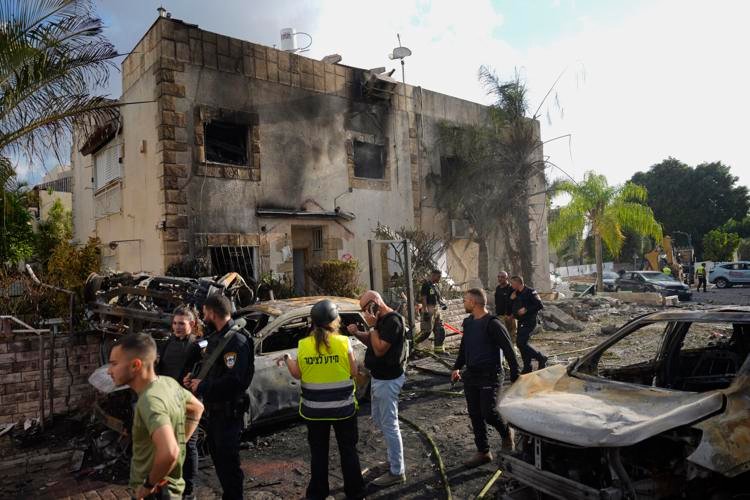Hezbollah-Israel
Hezbollah has fired more than 100 rockets into a broader and deeper region of northern Israel, with some striking areas near the city of Haifa, as Israel responded with hundreds of airstrikes on Lebanon. The exchange of heavy fire signals an escalating conflict, with both sides seemingly on the brink of full-scale war.
In a statement, a senior Hezbollah leader declared that an “open-ended battle of reckoning” had begun, marking a significant escalation in the long-standing hostilities between Hezbollah and Israel. The rocket barrage on Sunday morning came as a direct response to a series of Israeli strikes in Lebanon that have resulted in dozens of casualties, including the death of a veteran Hezbollah commander. Additionally, Israeli forces launched an unprecedented attack targeting the group’s communication infrastructure, further heightening tensions.
The barrage of rockets triggered air raid sirens across northern Israel, causing widespread panic as thousands of residents hurried into bomb shelters for protection. This dramatic increase in military activity on both sides has raised fears of a potential all-out war, as the conflict appears to be entering a dangerous new phase.
READ MORE: Four killed, 20 hurt in party precinct shooting
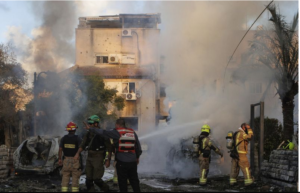
Rocket Strike By Hezbollah – Israel Near Haifa Causes Fires and Injuries
Hezbollah-Israel
A Hezbollah rocket struck near an apartment house in Kiryat Bialik, north of Haifa, injuring at least three people and setting fires to buildings and cars. According to Magen David Adom, four people suffered shrapnel injuries. Avi Vazana was driving his wife and their nine-month-old baby to a shelter when the rocket landed. “I heard the boom after we got inside,” he remembered, then ran outside barefoot and shirtless to make sure no one else needed to be rescued.
The chaos that followed the attack saw rescue teams put out fires and carried survivors to hospitals, further ratcheting up the sense of tension in northern Israel as residents scrambled for cover and the violence escalated.
The Health Ministry in Lebanon reported three deaths and four injuries from Israeli strikes along the southern border, but it did not specify whether the victims were civilians or combatants. Increased border attacks between Israel and Hezbollah have already created lots of horrors and uncertainties for the residents across the Lebanon-Israel border while people there are still unclear about the status of the victims.
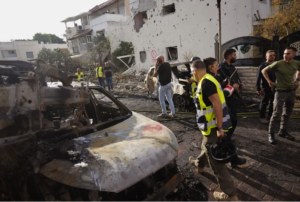
Hezbollah- Israel Turns Up the Ante, Rhetoric against Israel
Hezbollah-Israel
The deputy leader of Hezbollah, Naim Kassem, said the militant group has entered into “open-ended battle of reckoning” with Israel, and the threat there is further escalation that could displace more northern Israeli residents. Speaking at the funeral of senior commander Ibrahim Akil, Kassem emphasized the conflict was far from over and hinted at more severe actions.
“We are suffering. We are human, and we feel pain,” Kassem said. “But as we feel pain, you will also feel pain,” indicating Hezbollah’s intent to make Israel pay a heavy price.
He declared that the rocket shower into the Israeli land was only a beginning of their responses, promising more direct attacks on the economic infrastructure of Israel besides the military attacks. “We will strike where it hurts and break down the economy of Israel,” he threatened, but this seemed to expose an even larger plan than the military fight itself.
The rhetoric Kassem used still reached a serious escalation and emphasized Hezbollah’s eagerness to continue the conflict with airstrikes and military pressures and things seem to head toward a long and destructive confrontation.
The barrage came after Israeli airstrike in Beirut on Friday killed at least 45 people including one of Hezbollah’s top leaders as well as women and children.
Hezbollah was already grappling with significant setbacks sophisticated attack that caused thousands of pagers and walkie-talkies to explode just days earlier.
Hezbollah-Israel
The Israeli military says there have been a string of strikes across southern Lebanon during the past 24 hours, hitting some 400 militant sites, including rocket launchers.
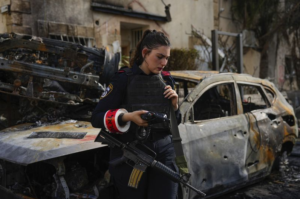 Hezbollah-Israel
Hezbollah-Israel
Lieutenant Colonel Nadav Shoshani, an Israeli military spokesman, stated that the recent strikes had successfully prevented a larger attack in the ongoing Hezbollah-Israel conflict. “Hundreds of thousands of civilians have come under fire across much of northern Israel,” he noted. “Today, we witnessed fire reaching deeper into Israeli territory than ever before.”
The military also reported intercepting multiple aerial devices launched from Iraq after Iran-backed militant groups claimed responsibility for a drone attack on Israel. In response to the escalating situation, Israel’s Health Ministry announced that all hospitals in the north would begin relocating operations to protected areas or shelters within their medical facilities.
In a separate incident, Israeli forces conducted a raid on the West Bank bureau of Al Jazeera, which had been banned earlier this year for allegedly acting as a mouthpiece for militant groups—an accusation that the pan-Arab broadcaster has denied.
UN envoy warns that the region is on the verge of a catastrophe.
Hezbollah-Israel
Israel and Hezbollah have been exchanging fire since the Gaza war broke out nearly a year ago. The militant group has sent rockets as a show of solidarity with its ally Hamas, which is backed by Iran. The low-level conflict has killed dozens of Israelis, hundreds of Lebanese, and displaced tens of thousands on both sides of the border.
Up until this point, neither side has been considered to be trying to achieve all-out war, and Hezbollah had avoided striking Tel Aviv or any other major civilian infrastructure. However, in the last few weeks, Israel has turned its focus away from Gaza and vowed to rebuild calm along the border so that its residents could return home. Hezbollah has assured its citizens that it will no longer attack unless a ceasefire in place is established in Gaza, an event which now appears more and more unlikely.
It was an attack by Hamas on Israel on October 7, killing and taking away about 1,200 to 250 other people. Today, it is reported that there are still around 100 hostages whom they hold in captivity; a third of them are said to be dead.
More than 41,000 Palestinians have been killed, according to Gaza’s Health Ministry, whose figures do not differentiate between fighters and civilians,” Mr. Habre writes. The ministry said that more than half of the deaths of 222,500 killed so far are women and children. Relatives of families held hostage are growing anxious that renewed fighting in the north will keep their case out of the spotlight and make any terms of their freedom the toughest to negotiate. The United Nations envoy to Lebanon appealed for calm from all parties in the conflict.
“With the region on the brink of an imminent catastrophe, it cannot be overstated: there is NO military solution that will make either side safer,” Jeanine Hennis-Plasschaert underlined in a post on X.
Media reports indicate that rockets fired from Lebanon early yesterday have been intercepted in the Haifa and Nazareth areas, which are further south than most of the rocket strikes up to now. Israel has canceled school across the northern region as the crisis escalates. 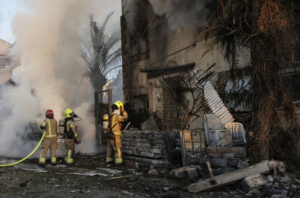
Hezbollah says it’s using new weapons
Hezbollah-Israel
He stated that Hezbollah had fired dozens of the Fadi 1 and Fadi 2 missiles—it was making their first-ever use—against the Ramat David airbase, southeast of Haifa. The action has been described as a response to repeated attacks by Israel on different parts of Lebanon in which it had slaughtered many civilians.
In July, Hezbollah released video it claimed to show surveillance footage of the airbase taken by its drones. The group also said it targeted the facilities of Rafael defense firm, headquartered in Haifa, in retaliation for an attack on wireless devices. However, the group presented no evidence, and the Israeli military refused to comment.
Hezbollah has threatened to react to a spate of explosions that have left pagers and walkie-talkies on which the group’s members depend out of commission since Tuesday and Wednesday, killing at least 37 people, of whom two were children, and injuring roughly 3,000. The attacks have been blamed by everybody on Israel, but the government has neither confirmed nor denied any involvement.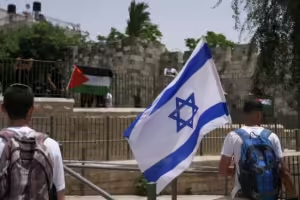 On Friday, an Israeli airstrike flattened an eight-storey building in a densely populated area of Beirut’s southern suburbs where Hezbollah members were said to have been meeting in the basement. Among the victims was Ibrahim Akil, a top Hezbollah official who was the chief of the organization’s special forces unit, known as Radwan Force.
On Friday, an Israeli airstrike flattened an eight-storey building in a densely populated area of Beirut’s southern suburbs where Hezbollah members were said to have been meeting in the basement. Among the victims was Ibrahim Akil, a top Hezbollah official who was the chief of the organization’s special forces unit, known as Radwan Force.
The airstrike killed at least seven women and three children, with many others wounded, according to reports from the Lebanese authorities. It was the most lethal attack on Beirut since a month-long war between Israel and Hezbollah in 2006.
“We torpedoed its whole chain of command, and got rid of Akil, who is responsible for Israel’s casualties,” said Israeli Defence Minister Yoav Gallant. Akil had been on the U.S. most-wanted list for years, with a $7 million reward offered for information leading to his capture, since he was accused of involvement in the 1983 bombing of the U.S. Embassy in Beirut and the hostage-taking of American and German citizens during Lebanon’s civil war in the 1980s.
For more visit :Global Politics
